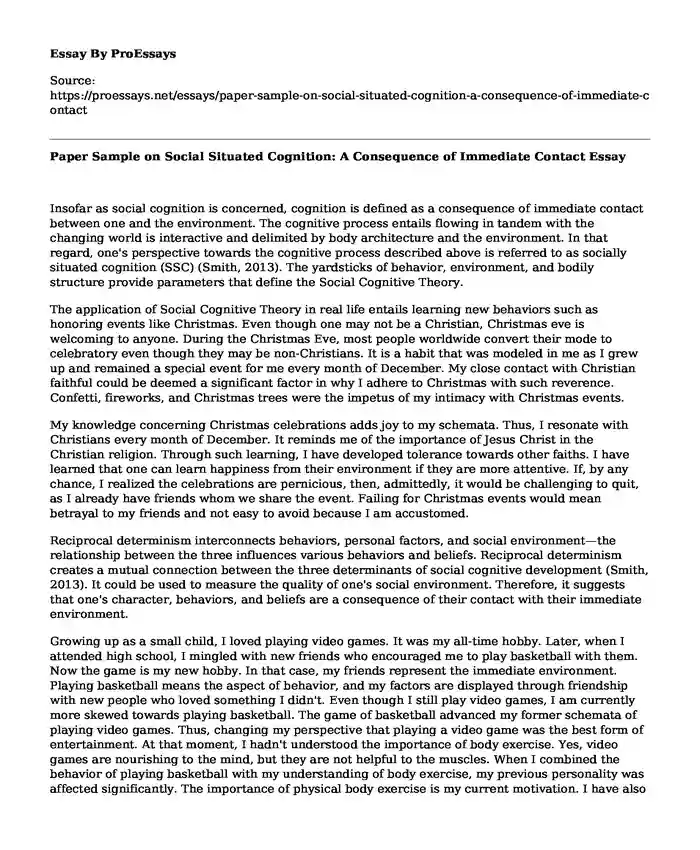Insofar as social cognition is concerned, cognition is defined as a consequence of immediate contact between one and the environment. The cognitive process entails flowing in tandem with the changing world is interactive and delimited by body architecture and the environment. In that regard, one's perspective towards the cognitive process described above is referred to as socially situated cognition (SSC) (Smith, 2013). The yardsticks of behavior, environment, and bodily structure provide parameters that define the Social Cognitive Theory.
The application of Social Cognitive Theory in real life entails learning new behaviors such as honoring events like Christmas. Even though one may not be a Christian, Christmas eve is welcoming to anyone. During the Christmas Eve, most people worldwide convert their mode to celebratory even though they may be non-Christians. It is a habit that was modeled in me as I grew up and remained a special event for me every month of December. My close contact with Christian faithful could be deemed a significant factor in why I adhere to Christmas with such reverence. Confetti, fireworks, and Christmas trees were the impetus of my intimacy with Christmas events.
My knowledge concerning Christmas celebrations adds joy to my schemata. Thus, I resonate with Christians every month of December. It reminds me of the importance of Jesus Christ in the Christian religion. Through such learning, I have developed tolerance towards other faiths. I have learned that one can learn happiness from their environment if they are more attentive. If, by any chance, I realized the celebrations are pernicious, then, admittedly, it would be challenging to quit, as I already have friends whom we share the event. Failing for Christmas events would mean betrayal to my friends and not easy to avoid because I am accustomed.
Reciprocal determinism interconnects behaviors, personal factors, and social environment—the relationship between the three influences various behaviors and beliefs. Reciprocal determinism creates a mutual connection between the three determinants of social cognitive development (Smith, 2013). It could be used to measure the quality of one's social environment. Therefore, it suggests that one's character, behaviors, and beliefs are a consequence of their contact with their immediate environment.
Growing up as a small child, I loved playing video games. It was my all-time hobby. Later, when I attended high school, I mingled with new friends who encouraged me to play basketball with them. Now the game is my new hobby. In that case, my friends represent the immediate environment. Playing basketball means the aspect of behavior, and my factors are displayed through friendship with new people who loved something I didn't. Even though I still play video games, I am currently more skewed towards playing basketball. The game of basketball advanced my former schemata of playing video games. Thus, changing my perspective that playing a video game was the best form of entertainment. At that moment, I hadn't understood the importance of body exercise. Yes, video games are nourishing to the mind, but they are not helpful to the muscles. When I combined the behavior of playing basketball with my understanding of body exercise, my previous personality was affected significantly. The importance of physical body exercise is my current motivation. I have also influenced some of my friends to join the basketball sport, even though some were defiant of the idea initially, most agreed to try. We have formed a team already, which indicates the importance of one's immediate environment for the development of behavior. My high school environment influenced me to join basketball. I later influenced my environment by introducing my friends to the sport.
Reference
Smith, E.R. (2013). Socially Situated Cognition in Perspective. Social Cognition. Indiana University, Bloomington. Vol 31 (2), pp. 125-146.
Cite this page
Paper Sample on Social Situated Cognition: A Consequence of Immediate Contact. (2023, Nov 24). Retrieved from https://proessays.net/essays/paper-sample-on-social-situated-cognition-a-consequence-of-immediate-contact
If you are the original author of this essay and no longer wish to have it published on the ProEssays website, please click below to request its removal:
- Principles and Assumptions of the Humanistic Approach to Counselling Essay
- When Photographs Create False Memories Essay
- Berger's Valuation of the Male Gaze Essay
- Creating Social Impact: Understanding Community Interest Companies - Essay Sample
- Essay Example on Rosa Parks: Beyond the Iconic Bus Ride - Exploring Cultural Myths
- Essay Example on Single Parenthood: Impact on Child Growth and Development
- Play Therapy Strategies for Children With ASD, ADHD, and Anxiety: Results and Challenges - Essay Sample







